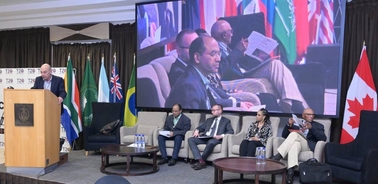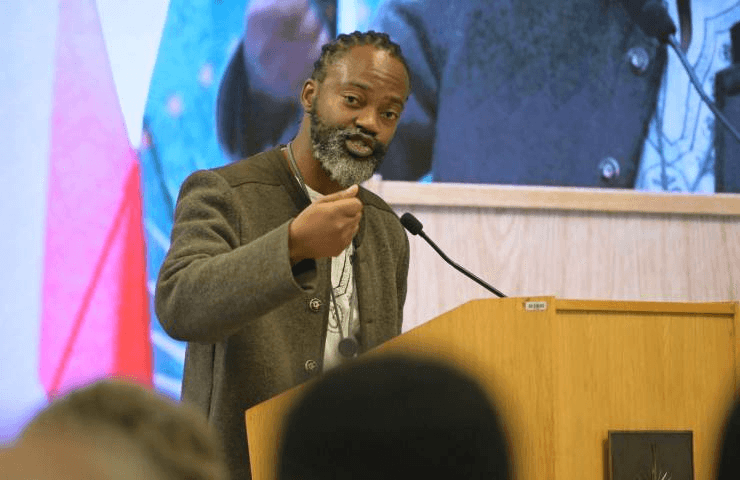T20 Midterm Conference Sets Policy Roadmap Ahead of G20 Leaders’ Summit

On June 19th, more than 200 delegates from 24 countries convened at the Kgorong Building of the University of South Africa for the Think 20 (T20) Midterm Conference, a landmark gathering under South Africa’s G20 Presidency. The event brought together leading policy researchers, T20 Task Force and Advisory Council members to review the progress emerging from the policy briefs and policy engagements; consider emerging issues and new ideas; and engage the G20 Sherpa.
Jointly hosted by the South African Institute of International Affairs (SAIIA), the Institute for Global Dialogue (IGD), and the Institute for Pan-African Thought and Conversation (IPATC), the conference featured seven dynamic panel discussions and over 40 speakers addressing the most pressing global issues—ranging from climate justice and digital equity to sustainable finance and multilateral reform.
Drafting High-Level Policy Recommendations
T20 Task Forces (TF) held closed working sessions to finalize the T20 High-Level Policy Recommendations to be delivered to the G20 Sherpa. These recommendations will directly inform the final communiqué ahead of the G20 Leaders’ Summit later this year.
The sessions were more than a drafting exercise—they provided a space to test the feasibility and transformative potential of policy ideas while underscoring the urgency of coordinated cross-sectoral implementation.
Evidence-Based Solutions for Global Impact
TF01 on Trade and investment underscored the need to reform the World Trade Organization (WTO) to protect and strengthen a rules-based, inclusive multilateral trading system. The group called for enhanced institutional capacity and funding for the WTO to better support pro-development agreements such as the Investment Facilitation for Development (IFD). Reform of the Generalised System of Preferences (GSP) was also proposed, with a view to ensuring more predictable and long-term market access for Least Developed Countries (LDCs). TF01 also promoted deeper regional trade integration by harmonizing physical, digital, and social infrastructure standards. In addition, it supported industrial policy tools and mechanisms for technology transfer to help countries pursue green industrialization and value-added production.
TF02 on Digital Transformation put forward bold measures to address digital divides and advance inclusive governance of emerging technologies. Central to its vision was funding the production of standard and novel digital statistics to inform evidence-based policy. TF02 also urged the G20 to champion integrated national and regional data governance frameworks that are equitable, rights-based, and future-ready. A people-centered approach to Digital Public Infrastructure (DPI) and emerging technologies was emphasized, with particular attention to multilingual, participatory, and accessible design. The work group further recommended that the G20 assume a leadership role in aligning global digital cooperation with sustainable development goals.
TF03 on Financing for Sustainable Development, with contributions from Luis de Lossada, GPC’s Research Associate and Project Manager, proposed a sweeping overhaul of the global financial system. Among its central recommendations was the call to eliminate IMF veto powers and redesign quota formulas to better reflect the vulnerabilities of Global South economies. It also advocated for the development of a multi-currency international financial architecture, encompassing local currency lending, cross-border payment systems, and currency swap lines. TF03 highlighted the importance of reducing the cost of capital through reformed debt sustainability frameworks, expanded access to long-term concessional finance, and improved transparency in credit rating methodologies. To address sovereign debt crises, the Task Force called for faster and more predictable resolution mechanisms, including climate clauses and debt pauses. Finally, it emphasized the urgency of advancing global tax justice through a UN-led tax convention, wealth taxation, and support for fiscal capacity-building in developing nations.
TF04 on Solidarity for the SDGs focused on aligning fiscal policy and international cooperation with the achievement of the Sustainable Development Goals (SDGs). It called for a global wealth tax and progressive fiscal reform to expand financing for development. The Task Force promoted the use of innovative debt instruments, such as debt-for-SDGs and debt-for-nature swaps, to better link debt relief with social and environmental investment. Operationalizing the Global Alliance Against Hunger and Poverty was a key priority, with a focus on measurable, country-level action plans for food system equity. TF04 also pushed for the restructuring of social protection systems to ensure universal and inclusive access to health, education, care services, and support mechanisms—particularly for communities impacted by conflict and environmental shocks.
TF05 on Accelerating Climate Action and the Just Energy Transition advanced a comprehensive vision for a just and inclusive green transition. It recommended the adoption of a Critical Minerals Governance Framework that ensures both fair benefit-sharing and rigorous environmental and social safeguards across the mineral value chain. To ensure meaningful progress on just transitions, TF05 advocated for national and global taxonomies rooted in poverty reduction, gender equity, and local empowerment. It urged G20 action to strengthen global climate insurance systems in collaboration with the insurance industry, addressing gaps in disaster protection and financial resilience. Lastly, TF05 called for the integration of climate and biodiversity policy with bioeconomy principles, backed by new and additional financing and anchored in multilateral cooperation and accountability.
A Platform for Global Policy Innovation
The T20 Midterm Conference reaffirmed the vital role of research institutions and think tanks in shaping policy that is not only evidence-based but action-oriented. As South Africa leads the G20 for the first time, the T20 is emerging as a strategic force in translating expert knowledge into meaningful, globally coordinated solutions.
Through collaboration across continents and disciplines, the T20 South Africa Midterm Conference proved that solidarity, sustainability, and shared prosperity are more than aspirations—they are policy priorities for a just global future.
